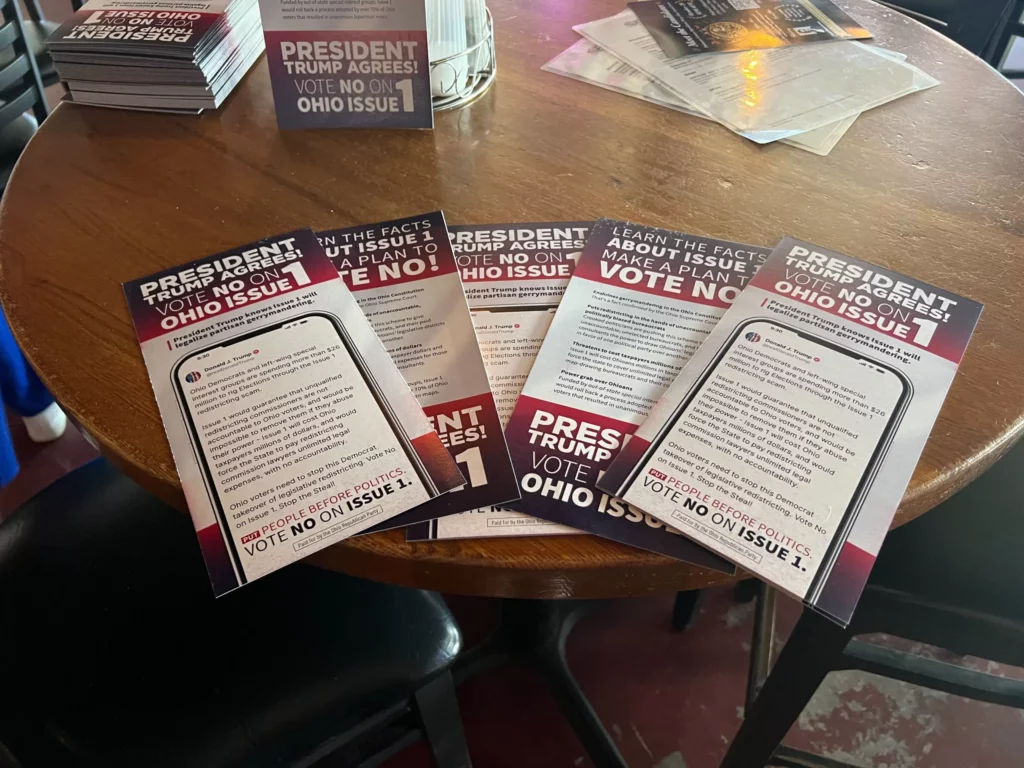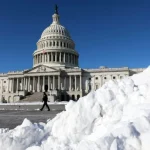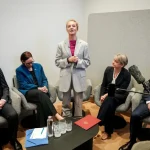
POWELL, Ohio — Republican leaders and conservative think tanks are warning voters that outsiders are looking to influence Ohio elections with millions of dollars pouring into Issue 1, an under-the-radar 2024 ballot initiative that would alter how districts are drawn in the Buckeye State.
For the last stop on the Ohio GOP’s “Vote NO on Issue 1” bus tour, party members and voters gathered over the weekend at the Lazy Chameleon bar in Delaware County to blast the level of outside spending from both out-of-state and foreign groups.
“This is a left-wing power grab in Ohio,” Ohio Republican Party Chairman Alex Triantafilou told the crowd of about 20 people. “More than $20 million came into Ohio to try and pass this initiative … money from places like San Francisco and New York and D.C.”

Both proponents and opponents of Issue 1 are using the term “gerrymandering,” a practice of drawing district maps to favor one party, in their campaigns and on their road signs. Democratic supporters see the current redistricting system as unfairly benefiting the GOP, while Republicans see the proposed bipartisan committee in Issue 1 as snuffing out the voices of voters and a way to increase Democratic representation on Capitol Hill.
“They want to put this provision into law so they can win more seats in the United States Congress and make Hakeem Jeffries the speaker,” Triantafilou said.
What is Issue 1?
A “yes” vote on Issue 1 will alter the redistricting process and take authority away from Ohio lawmakers and place it in the hands of a 15-member Ohio Citizens’ Redistricting Commission. The OCRC would be made up of Republican, Democratic, and independent citizens who represent the demographics of the state.
Under Issue 1, current or former politicians, political party officials, lobbyists, and large political donors would be banned from sitting on the commission. Proponents argue the goal is to create fair and impartial districts, making it unconstitutional to draw any districts that discriminate against a specific political party or individual politicians.
The ballot initiative comes after the Ohio Supreme Court struck down seven different maps drawn by Republicans on the current Ohio Redistricting Commission, which is made up of seven spots: two GOP, two Democratic, the governor, the secretary of state, and the auditor. With five of the seven seats held by Republicans, the state’s high court ruled over the last few years that the maps were unconstitutionally favoring the GOP.
Currently, Ohio’s U.S. congressional delegation is made up of 10 Republicans and five Democrats, but Issue 1 could shift three to six seats in Democrats’ favor by 2026, should the ballot measure pass.
A recent poll from Bowling Green State University’s Democracy and Public Policy Research Network found that 60% of Ohio citizens plan to vote in favor of Issue 1, while 20% plan to vote “no,” and 20% are not sure. Partisan differences show 82% of Democrats backing the measure versus 41% of Republicans, with 57% of independents planning to vote “yes” on the initiative.
However, Republicans are not putting much stock into the polls. Triantafilou said some of the polls show as much as 40% of voters are still “unaware” of Issue 1’s provisions and language.
“What we would say to folks is a couple key things: Read the language,” the state GOP chairman told the Washington Examiner in an interview. “The language says straight up, this would put gerrymandering into our state constitution.”
Triantafilou’s claim that gerrymandering would be put into the constitution comes from the ballot language that states Issue 1 would “repeal constitutional protections against gerrymandering.” If passed, the newly established commission would take effect 30 days after the election and would require it to create new legislative and congressional districts in 2025 immediately.
Ohio Democrats are pushing for Issue 1 on their social media, arguing that Ohioans “aren’t falling for the Ohio GOP’s lies” and that the ballot initiative would end GOP-influenced gerrymandering.
“It’s clear Ohioans want fair, citizen-led, redistricting reform,” the party wrote on Facebook. “It’s time to end the manipulation. Vote YES on Issue 1.”
In another post, Ohio Democrats said, “Gerrymandering has been used to dilute voting power in Ohio for far too long. Faith and civil rights leaders are backing Issue 1 because communities of color deserve fair representation, not district lines designed to splinter their voices.”
Jennifer Henderson Thomas, a Democrat from Columbus, said she voted in favor of Issue 1 because she “thought it was best” but admitted she didn’t know enough about it to have a strong opinion.
Triantafilou argued Issue 1 would be bad for independents and agreed that some measure of redistricting reform is needed but that “this is not the way to do it.”
“This is a bad plan,” the chairman told the crowd.
Delaware County GOP Chairman Patrick Grubbe told the Washington Examiner the county is traditionally “very solid red” but has since shifted as demographics from nearby metro areas change. Voter registration shows Delaware County has nearly 39,000 registered Republicans, over 16,000 registered Democrats, and over 110,000 people who are not registered with either party.
Grubbe said the biggest problem with Issue 1 is that it places redistricting authority “in unelected bureaucrats’ hands.” The ballot text notes that members of the proposed committee would not be able to be removed by voters, only by their fellow commission members.
“There’s going to be no accountability,” Grubbe said.
Ohio Republicans believe the “Vote No” bus tour, which launched on Oct. 8 and made stops in over 30 counties across the Buckeye State, yielded “supremely positive” results.
“We drive down the highway, and people are blowing their horn because they see the ‘vote Republican’ and — look, our job as a party organization is to educate our Republican faithful,” Triantafilou said. “And I think we’ve made great strides in doing that this week with our bus tour.”

Britney Walker, Delaware County GOP executive committee chairwoman, told the Washington Examiner she has spent her days educating early voters on Issue 1 at the county’s Board of Elections.
“Most people walk up, and they say, ‘I don’t know what I’m supposed to do about Issue 1, yes or no?’ Because they hear both sides saying we’re against gerrymandering, right? And so they just don’t know what to do with that,” Walker said.
“I think everybody’s against gerrymandering,” Walker added. “We want to keep like communities together, but if Issue 1 passes, it’s actually going to break up a lot of communities in order to be fair.”
Conservative groups blast foreign money pouring into Issue 1
Supporters of Issue 1 are led by Citizens Not Politicians, a nonpartisan coalition that was the driving force behind getting the constitutional amendment on November’s ballot. Former Ohio Supreme Court Chief Justice Maureen O’Connor, a Republican, is one of Issue 1’s top backers, along with state Democratic leaders and Sen. Sherrod Brown (D-OH).
“With this amendment on the ballot, Ohioans have the chance to reclaim their power from the self-serving politicians who want to stay in power long past their expiration date while ignoring the needs of the voters,” O’Connor told News 5 Cleveland.
Citizens Not Politicians has raised $23 million since the beginning of 2024 as of August. The largest donors are progressive or nonpartisan groups from Washington, D.C., funding about 60% of the campaign. Of the $23 million, $11.1 million has come from Washington, D.C., $3.6 million from Ohio, $3.4 million from Virginia, $2.1 million from California, $1.6 million from New York, and $1 million from Massachusetts.
Conservative groups have been quick to point out that one of Citizens Not Politicians’ top donors is the Sixteen Thirty Fund, a Washington, D.C.-based financial hub for liberal politics that has received nearly $243 million from Hansjorg Wyss, a liberal Swiss billionaire. Conservatives often blast the organization as a “dark money group,” given its undisclosed political spending.
Foreign nationals are barred from donating to individual campaigns and elections under federal law. However, the Federal Election Commission ruled ballot issues do not fall under that umbrella. To close the loop, Ohio signed into law a ban on foreign contributions to campaigns, including ballot measures, in May.
Honest Elections Project and Americans for Public Trust are pointing to Sixteen Thirty Fund’s donation of over $6 million to Citizens Not Politicians for Issue 1 before the ban took effect — the largest donation to the ballot measure campaign.
Jason Snead, executive director of the Honest Elections Project, told the Washington Examiner that loopholes allowing foreign nationals to contribute to ballot campaigns set up constitutional amendments as “Trojan horses for foreign influence.”
“There is a very simple expectation on the part of the average voter that American elections are going to be decided by Americans,” Snead said. “These [ballot] campaigns are every bit as significant as candidate races since they have the ability to literally and directly make law or rewrite state constitutions.”
Caitlin Sutherland, executive director of Americans for Public Trust, said the amount of outside spending from people like Wyss is a national security concern, equating it to the likes of Russia and China dumping money into American initiatives and ballot measures.
“Hansjorg Wyss, a foreign national, in his own words, has said that it is his goal to reinterpret the American Constitution in the light of progressive politics,” Sutherland said. “These ballot issues are rewriting the state’s constitution, so when you lay it all [out], it is incredibly alarming that someone’s goal and vision could then be executed in Ohio on Issue 1.”
To educate voters on Issue 1 with nearly 20 days until Election Day, Honest Elections Project and Americans for Public Trust launched a six-figure ad buy this weekend in opposition to Issue 1. Shared exclusively with the Washington Examiner, the 30-second digital ad highlights Wyss’s $6 million donation to Citizens Not Politicians.
“D.C. dark money has arrived in Ohio, courtesy of a foreign billionaire,” the ad states. “The plan: Pass a radical, anti-American ballot measure called Issue 1. They want to redraw your congressional districts, rig the rules, and guarantee their side wins. All the while silencing you.”
Snead, Sutherland, and Triantafilou all said they believe the pro-Issue 1 bloc is running a “highly deceptive” campaign on behalf of Democrats who are upset they do not have a majority in the state.
Growing up in Ohio, Snead pointed to the state’s purple history that has shifted over the last two presidential election cycles into an almost solid conservative state. He strongly objects to a new redistricting commission, arguing Issue 1 “will not reflect the views of people on the ground” and is an attempt to gerrymander in Democrats’ favor “under the guise of neutrality and nonpartisanship.”
“It is designed to cleave additional seats for the Left in a very, very red state,” Snead said, adding that he takes issue with the idea that the proposed commission would be unelected.
CLICK HERE TO READ MORE FROM THE WASHINGTON EXAMINER
“The further that we remove key principles of democratic self-government out of the democratic process, the less accountable government is overall,” Snead said.
The Washington Examiner reached out to Citizens Not Politicians multiple times for comment but received no response.







